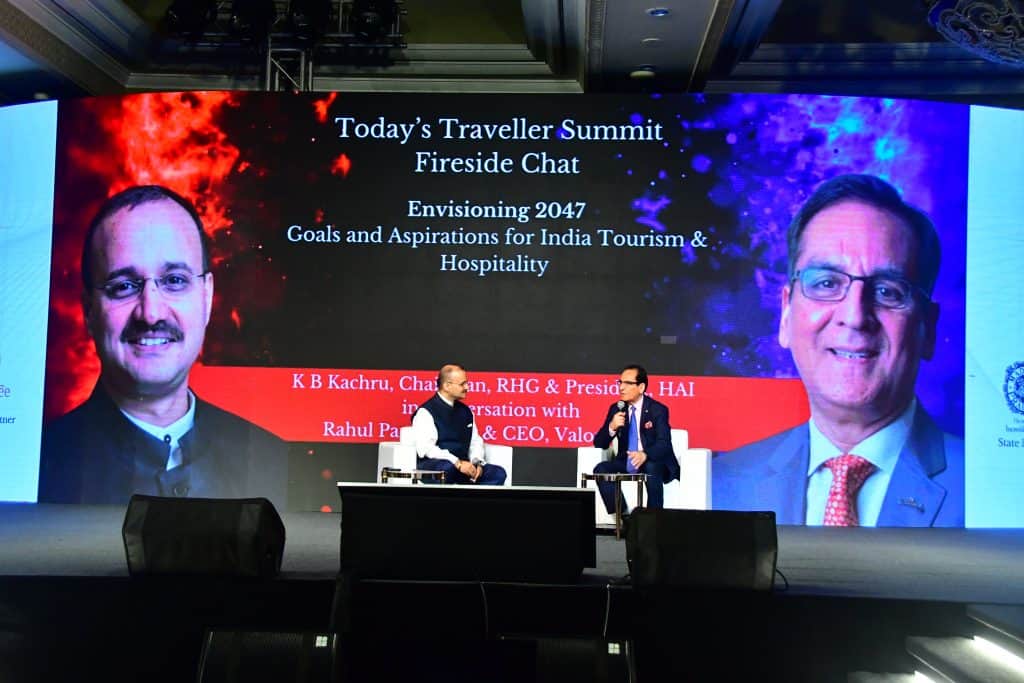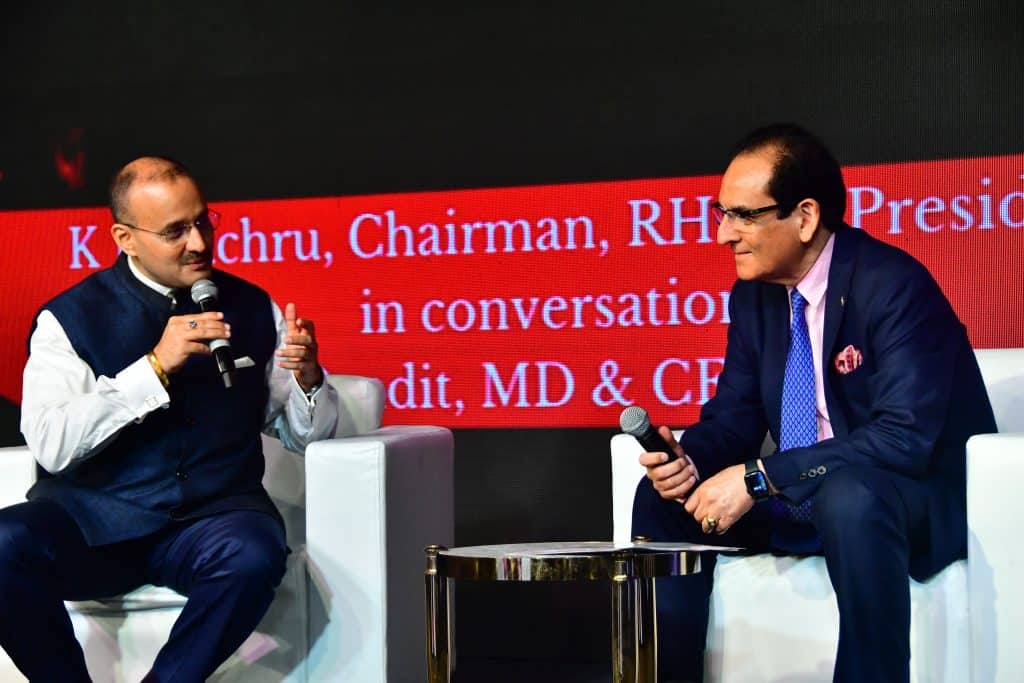At the Today’s Traveller Summit and Awards at the Taj Palace, industry stalwarts KB Kachru, Chairman, Radisson Hotel Group and Rahul Pandit, Managing Director & CEO Advent Hotels International captivated the audience with an intimate fireside chat, packed with stories, insights, and reflections on their journeys through the intricate world of hospitality and tourism.

Their discussion at the Today’s Traveller Awards and Summit, with an open exchange of personal experiences and strategic insights, illuminated the diverse layers of the industry—from people management to large-scale international development and navigating India’s evolving tourism landscape.
Leadership Across Diverse Ownership Models
Opening the dialogue, Rahul Pandit acknowledged Kachru’s expertise in managing complex enterprise structures and invited him to share his approach to handling diverse ownership models. Kachru, characteristically modest, shared, “It’s been really challenging. I was lucky to have opportunities with the government initially, and then to move to privately held companies. Later, we partnered with European companies like SAS, and eventually, we navigated more investor-driven dynamics with stakeholders from China and around the world, like HNA.” He credited his success to understanding shared objectives, explaining, “All the stakeholders had a common goal, and aligning with that was key. Each group had its sensitivities, but if you work toward a common objective, things align smoothly.”
Pandit noted that Kachru’s strength lies in a “very people-centric, collaborative approach.” He reflected on Kachru’s ability to balance strategy with human insight, a skill Pandit saw as central to Kachru’s success in his memoir, Humility and Agility. Curious, he prodded Kachru to recount an incident with then-Prime Minister Indira Gandhi, which Pandit saw as emblematic of Kachru’s respectful yet assertive approach.
Navigating Diplomacy at the Highest Levels
Kachru recalled the high-stakes moment with warmth and candour. “I never meant to challenge her. But I felt it was important to voice what I believed,” he explained. As he shared, he had been called to a meeting to discuss the menu for a state banquet, where over 120 heads of state would attend. Indira Gandhi was initially receptive to his idea of serving roast turkey—a dish he thought would impress the guests. “Then, out of nowhere, she suggested we add Hyderabadi biryani to the same plate. I was stunned because I felt the strong flavors would clash.”
Despite his caution, Gandhi insisted, even expressing frustration. “She said, ‘This is the youth of India—they are not ready for change.’ I had no choice but to go along with her idea. But in the end, the guests were served both dishes separately, and they appreciated it.” His story illustrated the delicate balance of standing by one’s convictions while respecting authority—skills essential in diplomacy and leadership alike.
In a lighter moment, Pandit recalled another incident he’d read about where Kachru changed the “weather” for Gandhi. Laughing, Kachru shared the details: “She arrived and asked me, ‘Mausam kaisa hai?’—‘How is the weather?’ I hesitated, hoping she’d forget, but she pressed, saying she wasn’t sure if she needed her shawl. I quickly agreed she should use it, then discreetly instructed the engineering team to lower the temperature by 4–5 degrees.” The story was met with laughter, embodying the art of on-the-spot problem-solving in hospitality.
A Journey of Development and Expansion
Shifting focus, Pandit highlighted Kachru’s legacy in development, pointing to milestones like launching Indian cuisine in Russia through Ashok Corporation and introducing Radisson Hotels to diverse geographies, from Thailand to Mauritius and, importantly, India. Curious about the momentum behind Kachru’s ambitious expansion, Pandit asked what fueled this drive.
Kachru humbly attributed it to timing and serendipity. “I was at the right place at the right time. I wasn’t born a developer—I was just fortunate,” he said.
Reflecting on his journey with Bicky Oberoi to create an Indian QSR chain akin to McDonald’s, he revealed, “We spent over $1 million on research, but in the end, it didn’t work. Sometimes, you have to accept when things don’t go as planned.” The Ashok Corporation venture in Moscow was also a blend of diplomacy and timing. “India was the first country to start a joint venture in the Soviet Union. Queues for dinner started at 1 PM, and we earned more from two Moscow restaurants than from all 40 ITDC hotels in India,” he shared.
For Kachru, success was inseparable from the contributions of his team. He praised leaders like Zubin Saxena and Nikhil Sharma, who propelled Radisson forward, stating, “I was there to facilitate. They did 99% of the work. If the team believes in the vision, anything is possible.” Emphasizing positivity and humility, he added, “Believe in positivity, and it will come to you. But gratitude and humility will carry you further than anything.”
Tourism’s Impact and India’s Untapped Potential
Taking a broader perspective, Pandit examined the contribution of tourism to India’s economy, noting that it comprises 6.23% of India’s GDP and 8.78% of employment—yet, given its potential, the sector remains underdeveloped. Despite its economic weight, he argued that tourism has even more potential, especially given the challenge of creating a million jobs per month in India. “Tourism punches above its weight and contributes 40% more to employment than other industries. So why has progress been slower?” he asked.
Kachru emphasized that while the industry has made strides, policy changes and incentives are essential. “We’re aiming for a $1 trillion contribution by 2047, but to achieve that, we need policies that attract investors. Today, most of our business relies on HNIs (High Net Worth Individuals), but to expand, we need more social investment and a clear policy framework,” he explained. He pointed out that while 17 states have granted interest subsidies, only a few execute them effectively. “If we could resolve this, tourism could solve 50% of India’s unemployment issues. We’re not asking for subsidies—just consistency in policy.” He cited the continued lack of incentives and the ad hoc nature of policy implementation as major roadblocks.
Moreover, he underscored the importance of creating a work-life balance to attract young talent, noting that a collaborative task force recently formed by the government should prioritize this. “If we don’t create balance, today’s youth won’t join the industry. Government and industry both need to walk the talk to achieve these targets,” Kachru concluded.
When Kachru turned the question to Pandit, asking how the industry could be structurally enabled, Pandit suggested starting with education. “Tourism should be part of school curriculums,” he proposed, explaining that this would achieve multiple goals. “First, it would teach children respect for heritage and pride in our institutions. Imagine taking them to Parliament or the Supreme Court—they’d learn democracy firsthand.” He cited historic landmarks, from the temples of the Chola Dynasty to modern marvels like Sriharikota’s ISRO. “It’s about making Vasudhaiva Kutumbakam practical. If we embed the subject in education, we create a new business segment and foster national pride.”
The Need for Strong Marketing and Global Ambassadors
In closing, Kachru emphasized a critical but overlooked area: inbound marketing. “We need ambassadors for India’s tourism,” he stated. Pointing to successful campaigns in Dubai and Gujarat, he suggested, “Why not have Ronaldo kicking a ball from Barcelona to Kashmir or Goa?” This, he argued, would bring India’s tourism appeal to an international audience, essential for positioning India as a global travel destination.

Their conversation was a testament to the breadth of knowledge and experience both leaders have brought to the industry. The fireside chat offered a rich tapestry of insights—from leadership lessons and personal anecdotes to strategies for driving tourism forward. Together, they envisioned a future where Indian tourism achieves its true potential, driven by collaboration, innovative policies, and a renewed commitment to showcasing the country’s rich heritage on the world stage.
About Today’s Traveller Awards and Summit 2024
The prestigious Todays Traveller Awards 2024, hosted by India’s leading travel, hospitality, and tourism magazine, marked the 27th anniversary of Today’s Traveller with a spectacular celebration at the iconic Taj Palace, New Delhi.
Among the hospitality and tourism triumphs at the Todays Traveller Awards 2024, was the recognition of trailblazing leaders who have shaped the industry with their vision and innovation at a marquee event that stands as a pinnacle of recognition within the corporate, hospitality, travel, and tourism sectors. The day was further elevated with thought-provoking leadership discussions at The Today’s Traveller Summit, followed by the grand unveiling of the Collector’s Edition of Today’s Traveller Magazine, aptly titled “Strategists of Success.” It was a night to remember, celebrating the very best in the world of travel and hospitality.
Kamal Gill’s Vision for Collaboration and Future-Shaping at Today’s Traveller Summit
In her welcome speech, Kamal Gill, Executive Editor and Managing Director Today’s Traveller and Gill India Group said, ” The Today’s Traveller Summit is more than just a meeting of minds; it’s a unique opportunity to foster meaningful collaborations and spark discussions that will shape the future of our industries. This gathering aims to foster meaningful collaborations and discussions.”
She went on to say, “A primary goal of the Summit is to facilitate networking with global industry pioneers. Structured panel discussions and social networking events are crafted to help forge valuable relationships that could lead to new ventures, partnerships, and collaborations. Moreover, the summit encourages open dialogue and the formation of partnerships that break conventional boundaries. As leaders in hospitality and tourism align their visions and resources, they set the stage for groundbreaking initiatives.”
She concluded with, “Today’s Traveller Summit looks to explore new partnerships and leverage collective influence, steering the industry towards a trajectory of shared success with fellow industry leaders. I’m confident that the insights shared today will not only contribute to the future of our industries but also inspire us all to think bigger and bolder.”
Read more: News




1 Comment